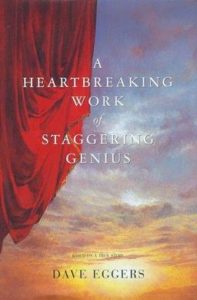
A Heartbreaking Work of Staggering Genius
By Dave Eggers
416 pages
First published Feb. 1, 2000 by Simon & Schuster
I read it because AS recommended it, saying, “Read it and tell me what you think of it.” (He knows that I can’t resist telling people what I think.)
I liked the title. It’s big. Intriguing. Ambitious. I expected something like Infinite Jest. It wasn’t that, but it was good. So good I had a dream about it.
An old bookstore. Eggers is reading from the book. Afterwards, as he’s signing my copy, I say, “I admire what you did here. You are a better writer than I am.”
He looks quizzically at me, smiles, and says, “No, I am a much better writer than you are.”
I blush and say, “How would you know? You’ve never seen my writing.”
And then he looks to the rest of his fans, who are standing behind me in the queue, and they are smirking.
But I won’t let that color my comments here. Dave Eggers is a very good writer. He is very smart. And he is very good with words. Clever with his sentences. Brilliant in creating layered, evocative descriptions. (See examples, below.) But the story he tells here – an account of his life as a 20-something caretaker of his little brother after both of their parents died in the same year of cancer – feels sometimes too much about his post-adolescent, anguished feelings.
That aside, there is so much to enjoy in this book. To begin with, as a preface entitled, “Rules and Suggestions for Enjoyment of This Book,” he tells the reader that it may not be worth it to read the entire thing from cover to cover and offers his recommendations for passages to read or skip. This is actually an ingenious literary device. As one reviewer put it, it allows the reader “to be fascinated either by the tale only or by the telling of the tale, which keeps him inside the fiction.”
And I really like his writing style – a style that is very much his own. Reading Eggers for the first time, I was reminded of how I felt when I first read Cormac McCarthy – delighted and intimidated.
Here are two examples from the book:
“Can you see us, in our little red car? Picture us from above, as if you were flying above us in, say, a helicopter, or on the back of a bird, as our car hurtles, low to the ground, straining on the slow upward trajectory but still at sixty, sixty-five, around the relentless, sometimes ridiculous bends of Highway 1. Look at us, godammit, the two of us slingshotted from the back side of the moon, greedily cartwheeling toward everything we are owed.”
Or this one, where he describes his mother in her final weeks:
“I step down into the garage and she spits. It is audible, the gurgling sound. She does not have the towel or the half-moon receptacle. The green fluid comes over her chin and lands on her nightgown. A second wave comes but she holds her mouth closed, her cheeks puffed out. There is green fluid on her face.”
Critical Reception
A Heartbreaking Work of Staggering Genius won many awards, including “Best Book of the Year” from Time magazine, The Washington Post, the San Francisco Chronicle, and the Los Angeles Times. It was a finalist for the 2001 Pulitzer Prize for General Non-Fiction.
* “Is this how all orphans would speak – ‘I am at once pitiful and monstrous, I know’ – if they had Dave Eggers’s prodigious linguistic gifts? For he does write wonderfully, and this is an extremely impressive debut.” (John Banville, Irish Times)
* “A virtuosic piece of writing, a big, daring, manic-depressive stew of a book that noisily announces the debut of a talented – yes, staggeringly talented – new writer.” (Michiko Kakutani, New York Times)
* “Eggers evokes the terrible beauty of youth like a young Bob Dylan, frothing with furious anger…. He takes us close, shows us as much as he can bear…. His book is a comic and moving witness that transcends and transgresses formal boundaries.” (Washington Post)
Click here to watch an interview with Eggers about the book.
About Dave Eggers

Dave Eggers is the author of more than 40 books, including novels, nonfiction, short story collections, and children’s books. He has written several screenplays for films based on his books, including The Circle and A Hologram for the King. He is the founder of Timothy McSweeney’s Quarterly Concern, a literary journal; a co-founder of the literacy project 826 Valencia and the human rights nonprofit Voice of Witness. In 2005, he was named one of Time magazine’s “100 Most Influential People.” He lives in the San Francisco Bay area with his wife, Vendela Vida (who is also a writer), and their two children.
 MarkFord
MarkFord